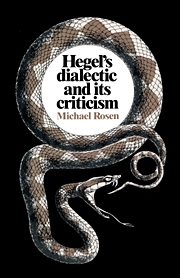Book contents
- Frontmatter
- Contents
- Preface
- A note on texts and translations
- Abbreviations of works referred to
- 1 The Interpretation of Philosophy
- 2 Determinate Negation and Immanent Critique
- 3 The Dialectical Movement
- 4 Imageless Truth
- 5 The Prose of Thought
- 6 From Being to Nothingness (and Back Again)
- 7 A Negative Dialectic?
- 8 Conclusion
- Bibliography
- Index
6 - From Being to Nothingness (and Back Again)
Published online by Cambridge University Press: 26 January 2010
- Frontmatter
- Contents
- Preface
- A note on texts and translations
- Abbreviations of works referred to
- 1 The Interpretation of Philosophy
- 2 Determinate Negation and Immanent Critique
- 3 The Dialectical Movement
- 4 Imageless Truth
- 5 The Prose of Thought
- 6 From Being to Nothingness (and Back Again)
- 7 A Negative Dialectic?
- 8 Conclusion
- Bibliography
- Index
Summary
Das Nichts hungert nach dem Etwas.
J. BöhmeAlthough I think that Dieter Henrich exaggerates when he claims that the critical discussion of the last century developed interpretation of the beginning of the Logic to a point beyond which no significant progress has been made, his observation that this text has been singled out, above all others, for scrutiny, is pertinent. This body of discussion exerts its own force and means that the beginning of the Logic claims the attention even of those, like Henrich, who believe that it is a relatively trivial matter.
In this chapter I am concerned to show the consequences of three of the principles whose importance for Hegel's philosophy I have argued in the preceding ones.
(1) The forward movement of the Logic, if it is to be in keeping with Hegel's own understanding of his philosophy, must be rigorous and perspicuous ex ante. Any account which needs to supplement the forward movement with a retrospective justification must violate Hegel's self-understanding. This rules out Henrich's own attempt to contrast the progressive development of the thought-determinations in the exposition of the Logic with what he calls a ‘metalogic’ of their justification:
The Science of Logic must be distinguished from the process of the Logical determinations of Thought. This process takes place as a univocal development. Its Science, however, is a mode of the actuality of Spirit. To a great extent it only allows of being unfolded with retrospective justification and with regard to the whole.[…]
- Type
- Chapter
- Information
- Hegel's Dialectic and its Criticism , pp. 143 - 152Publisher: Cambridge University PressPrint publication year: 1982

